A 'completely different atmosphere': How these lawmakers are working together now on Wisconsin elections
- Oops!Something went wrong.Please try again later.
- Oops!Something went wrong.Please try again later.
- Oops!Something went wrong.Please try again later.
- Oops!Something went wrong.Please try again later.
- Oops!Something went wrong.Please try again later.
MADISON — In the state Capitol, it's not common for a Republican representative to pop into a Democratic senator's office while getting his daily steps in, even if they've served together for nearly a decade.
So, when Rep. Scott Krug walked in to say hello and meet the staff in Sen. Mark Spreitzer's office, it came as a bit of a surprise.
"Literally the entire staff stopped — some walking, some sitting — looking like, 'What do we do now?' Like, just wanted to come say hi," recalled Krug. "It was just people talking to people."
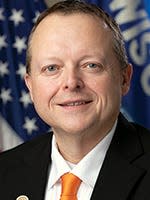
The two lawmakers sit on their chambers' respective committee that handles bills related to campaigns and elections. Krug is the chair of that group in the Assembly, and Spreitzer is the ranking Democrat on the Senate committee.
Spreitzer has his own story of bipartisanship. He had been arguing with the Senate committee's chair, Republican Sen. Dan Knodl, over a contentious attempt to remove Meagan Wolfe, the administrator of the Wisconsin Elections Commission.
"In that very same hearing, we were basically yelling at each other," Spreitzer said. "Then we step out of the chair, and go down and sit next to each other, and testify together on a bipartisan bill. That's been this session."
Difficult conversations about changing elections and voting rules still happen between lawmakers, including Krug and Rep. Lee Snodgrass, a Democrat on his committee. They hadn't really talked to each other before they were assigned to the group, but the two now check in nearly every day.
And when Snodgrass was listening to clerks testify that they'd like to end a requirement to put poll list numbers on the back of absentee ballots, she looked across the table at Rep. Donna Rozar, a Republican. In an interview, Rozar noted they have "a lot of ideological differences, and they're pretty significant."
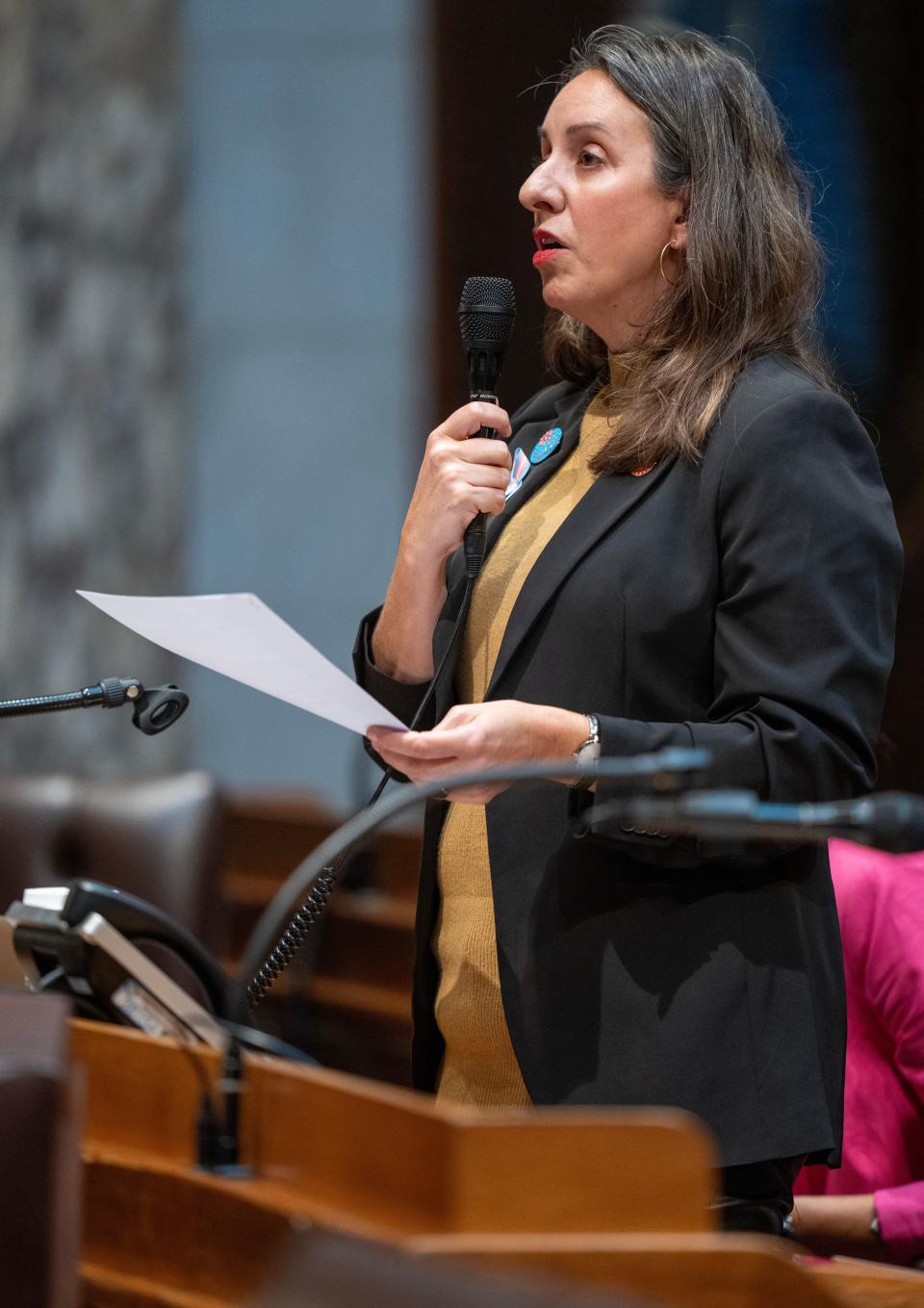
But they "did one of those gestures like, 'Do you want to work on a bill? Do you want to do this together?'" Snodgrass said. "Almost without words, we had decided that we were going to work on this together. Within 24 hours, we had a bill draft in the works."
A handful of election bills with bipartisan support have passed the committee and the full Assembly. They include preventing polling place closures, sending text alerts to voters and requiring election officials to review additional nomination paper signatures if some are found invalid.
But many of those bills haven't gotten a vote in the Senate, where some Republicans have focused on impeaching Wolfe or abolishing WEC — issues based in former President Donald Trump's false claims of fraud in the 2020 election.
Changed atmosphere after past chair held election conspiracy hearings
One clerk who testifies frequently said the current Assembly Committee on Campaigns and Elections has a "completely different atmosphere" than the one before it.
Krug took over the committee from Rep. Janel Brandtjen, who was removed as chair and ousted from the Assembly GOP caucus after campaigning against Speaker Robin Vos and promoting falsehoods about the 2020 election. She has twice tried unsuccessfully to initiate Wolfe's impeachment on the Assembly floor.
As chair, Brandtjen gave a platform to election deniers, including holding an informational hearing featuring Peter Bernegger, a felon convicted of fraud who embarked on his own election review.
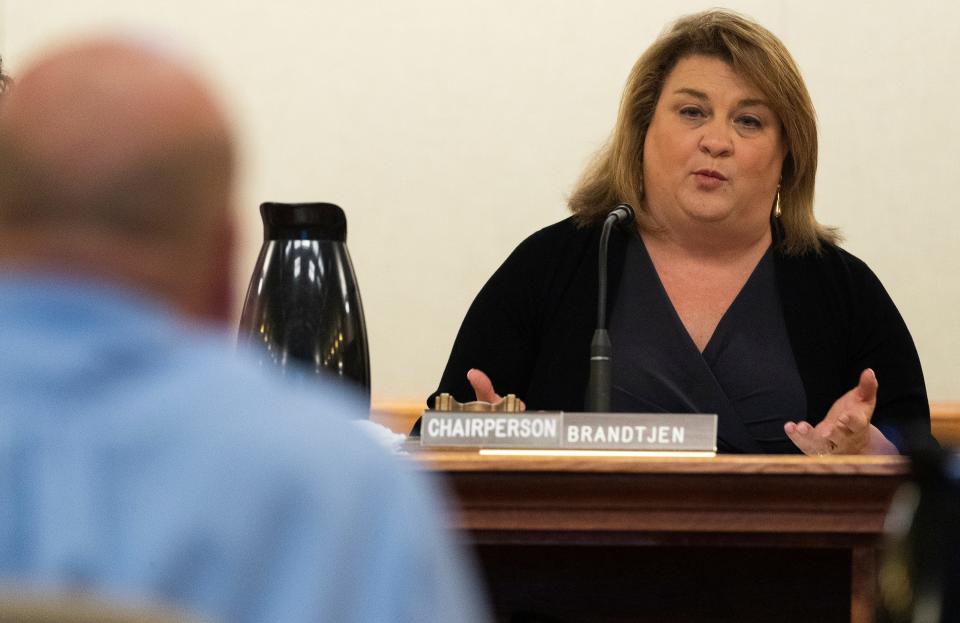
"There was just no oxygen in the room for any sort of bipartisan work that session," said Spreitzer, who was on the Assembly committee at the time. Brandtjen didn't respond to an interview request for this story.
After the last session, Krug "felt kind of compelled to talk to Vos and say, 'I think we need a different way forward.'" The elections committee was "probably the last thing" he ever thought he would chair.
Krug said his legislative career is closer to the end than the beginning and said he felt a responsibility to "take on some of the lightning that's going to strike." He finds inspiration in former Gov. Tommy Thompson's style of governing.
"There's a little frivolity every now and then" on the committee, Rozar noted, and "people just try to lighten the atmosphere." Snodgrass credited Krug for "setting the tone of cooperation and trust" from the first hearing.
Krug has held hearings for bills with only Democratic authors, which is unusual in the Republican-led Legislature. And he's scheduled hearings for ones he doesn't necessarily agree with, even if some Republican proposals await Democratic Gov. Tony Evers' veto pen.
In Evers' first term, "we would throw a lot of stuff at the wall, and know he's going to veto it," Krug said. "People just got sick of it, saying, 'Are you ever going to get anything done?' So I think I just wanted to take a new tack."
Clerks say they feel heard in the legislative process
Clerks had been wary of proposed changes that came out of the committees two years ago. They felt more absentee ballot paperwork would add to their workload, and restricting who could return ballots on behalf of a voter would be difficult to enforce.
In interviews with the Milwaukee Journal Sentinel, clerks said they feel more heard and lawmakers are asking for their thoughts when drafting bills that affect their work. Some lawmakers have clerks on "speed dial." Several of them joke, but sound serious, when they call Lisa Tollefson their favorite clerk.
"I like going through legislation and the statutes. It's kind of like candy to my brain," said Tollefson, who co-chairs the Wisconsin County Clerks Association's legislative committee.
Tollefson is the clerk for Rock County, the ninth-most populous in the state, but she grew up on a dairy farm in central Wisconsin. She thinks through how bills would affect how clerks hold elections in both large and small municipalities.
Driving north to the Capitol to speak at daylong hearings takes about an hour for Tollefson, and 45 minutes for Green County Clerk Arianna Voegeli, who testified for the first time this fall. She felt compelled to oppose a bill that would allow election observers to stand within three feet of voters and poll workers.
"I know how uncomfortable our municipal clerks have been over the last couple of years, with all the scrutiny that's been put on them," Voegeli said in an interview. "Having somebody hovering over my shoulder, essentially, while I work all day in such an important role ... I think that would cause a lot of our election officials to no longer want to work."
Clerks were also getting worn out and leaving the profession when voting rules changed quickly in the early 2010s, including the voter ID law, Krug said. He had just come into the Legislature and clerks were asking him if lawmakers could slow down.
How legislators have solicited clerks' input "just has not been the case before. It's kind of been like we're the red-headed stepchildren in the corner," Marathon County Clerk Kim Trueblood said. "It's been a breath of fresh air, truly."
Major legislation would prevent voter confusion
One of clerks' top priorities, which they shared in an informational hearing before the Assembly committee, is one step away from becoming law before the 2024 elections — when national attention may again turn to how quickly Wisconsin's results come in.
The bipartisan bill would allow clerks to begin processing absentee ballots the day before Election Day. Most states already have a longer window to start that work. The ballots wouldn't be counted until polls close, but clerks could do many tasks early, like checking the envelope for a witness signature.
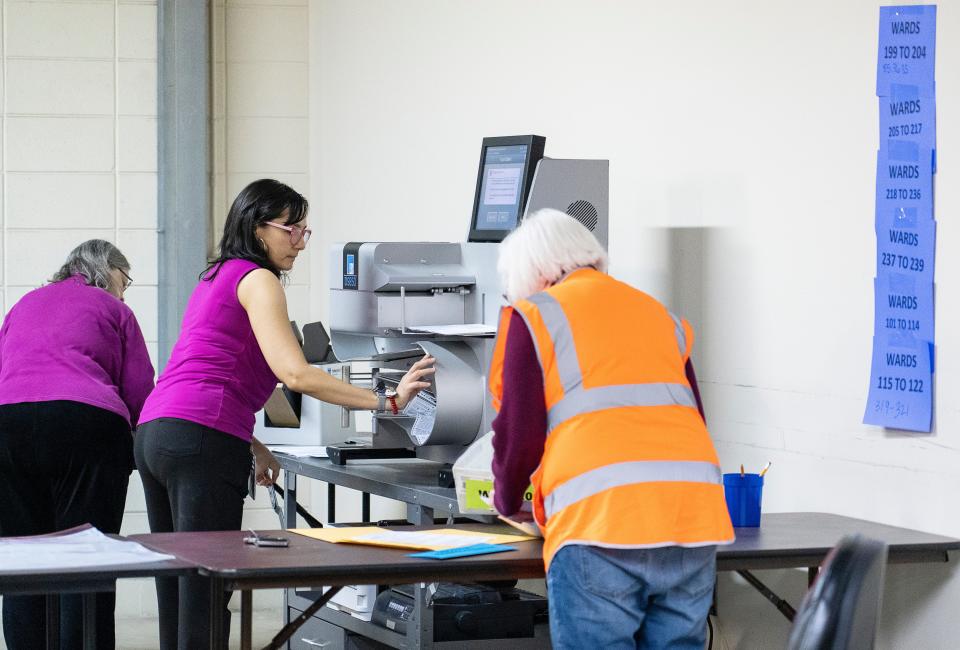
Conspiracies about "ballot dumps" spring up when large numbers of absentee ballots are processed late and added to the totals. Perception has become reality, clerks and lawmakers agreed. And Milwaukee is often at the center of that scrutiny.
"The results on election night will be done and out sooner for the public," Tollefson said. "And I think that clarity to our voters, getting things done more timely ... it's going be a lot more transparent."
Clerks have long asked for the change. Brandtjen didn't hold a hearing on a previous version when she was chair and opposes the current bill, telling a conservative news outlet that she has concerns about security.
Trueblood, the Republican clerk for Marathon County, said she thought the security provisions in the bill "are really strong."
She said keeping equipment and materials in a double-locked location is doable, and "there are tamper-evident seals on those machines. You cannot get anywhere to print reports or look at results without breaking those seals."
Trueblood said she was "a little bit skeptical" about the logistics of Monday processing when it was first introduced. But when clerks were told to shut down voting machines and hold off on reporting results during the April 2020 election, she got firsthand experience of how it could work.
Election officials said it would be helpful to have Monday processing in place by the August election, or even for April's presidential preference election. If the bill reaches his desk, Evers has said he will sign it if no "poison pills" are added.
Bill is still in Senate, where election distrust remains
But the bill appears stalled in the Senate, where Republicans have unsuccessfully tried to remove Wolfe and Knodl has led the effort to transfer WEC's duties to the secretary of state, with oversight from the GOP-led Legislature.
"It does feel like there's been a little bit of a swap of, last session it was the Senate committee doing all the work, and now the Assembly is certainly where more of the action is," Spreitzer said.
Former Sen. Kathy Bernier, who had been a county clerk, chaired the committee at the time. She now leads the state chapter of a group that works to restore voters' trust in elections.
"We still have some very opinionated senators in regard to the election outcome or result, that in my professional opinion, don't really understand where the checks and balances are," Bernier said in an interview.
Bernier still exchanges thoughts on bills with Knodl, who now chairs the Senate committee. Knodl didn't agree to an interview, but his office referred to a Dec. 22 newsletter in which he told constituents he didn't plan to hold an executive session to recommend the Monday processing bill for passage.
"Monday processing of ballots for efficiency sounds like a reasonable plan," Knodl said. "Unfortunately, there are concerns with the chain of custody of ballots and the hearing revealed the disparity of partisan observers of central count processing."
While the bill could get taken up on the floor at this point, Senate Majority Leader Devin LeMahieu recently told reporters he believed it was still in committee.
"We'll look at every bill that comes out of committee, see if we have 17 votes for it," LeMahieu said, referring to the number of only Republican votes that could advance a bill. "I was, in the past, the sponsor of that bill, so I do not oppose that bill."
Lawmakers say bipartisanship shouldn't be out of the ordinary
Having early conversations with the governor's office about a large piece of legislation like the Monday processing bill is something Krug and Spreitzer would like to see more of, since Republican lawmakers and Evers seldom communicate.
"That sausage-making, we put it all on the front end instead of during the process," Krug said. "I wanted to make sure everybody was there before we even started. Because if people weren't, it would have driven some of those more conspiracy-minded folks to come yell and scream and holler even more."
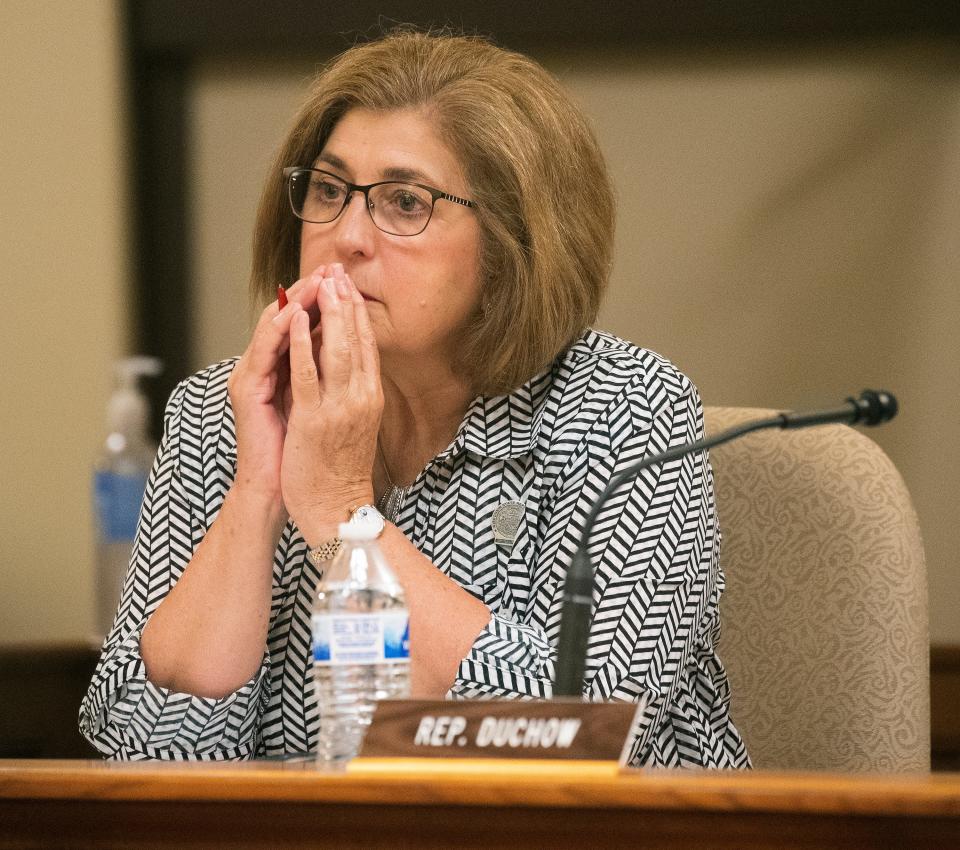
Some Republicans have criticized their colleagues' openness to working across the aisle. Rozar got a call asking what she was doing working with a Democrat.
"I think that discourages people from working in a bipartisan nature, because that working together can be exploited," Rozar said.
Snodgrass noted that bipartisanship should be the norm, not something that attracts attention.
"I give (Krug) tons of credit for it, especially because I know he's getting some grief for doing so," she said. "But isn't it kind of sad that we're actually doing stories on what should be respectable governing?"
This article originally appeared on Milwaukee Journal Sentinel: Bipartisan bills on Wisconsin elections? These lawmakers are doing it.
